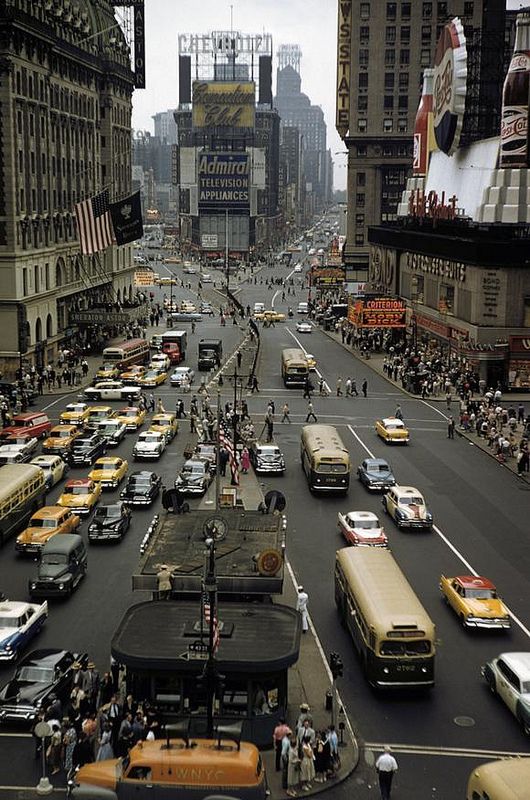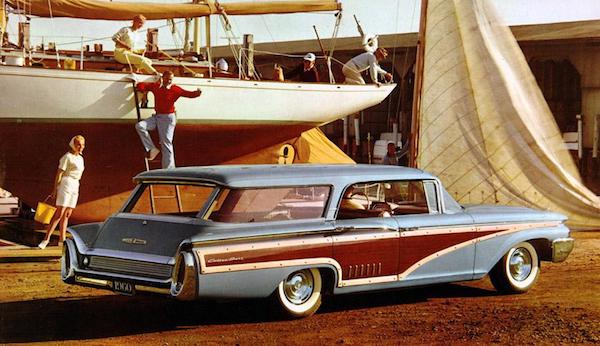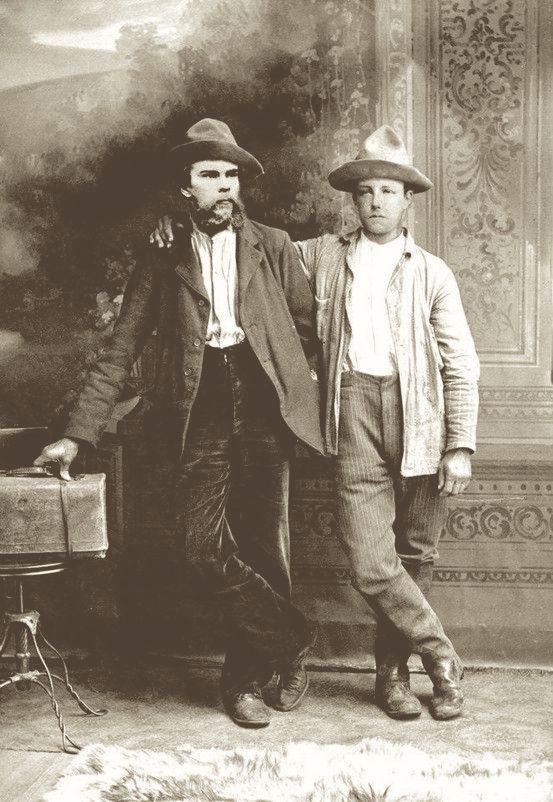
Times Square New York City, 1958
A few days ago, I wrote an essay entitled “Not Nearly Enough Growth To Keep Growing”, in which I posited, among many other things, that “..the Automatic Earth has said for many years that the peak of our wealth was sometime in the 1970’s or even late 1960’s” along with the question “..was America at its richest right before or right after Nixon took the country off the gold standard in 1971?”
That same day, I received an email from (very) long time Automatic Earth reader and afficionado Ken Latta, who implied he thought the peak of American wealth was even earlier. That turned into a nice conversation. I really like the way his head works to frame his words. And Ken knows what he’s talking about by grace of the fact that he was a witness to it all.
I like that he defines wealth as “best measured by the capacity to be utterly wasteful”, and the early 1960’s in America as “a golden age, overshadowed, of course, by excess hubris.”. And I wonder many of you would agree that America was at the summit of its wealth perhaps as much as 55-60 years ago?
Here’s his first mail:
Ken Latta: Ilargi, A darned good editorial, but I would like to suggest a different baseline for America’s peak wealth. As experienced by the common man, now pronounced “deplorable”.
In my humble estimation based on having been there at the time. Peak wealth occurred somewhere in the neighborhood of 1963. It was a time when the Beach Boys and their music biz competitors were making money with songs about hi-powered cars and a life of surfing waves. Working Joes bought those cars and drove them on the street. Those on the coasts spent inordinate amounts of time surfing. A lot of ordinary car buyers were committed to trading in every three years. Some of the better off even thought every two years was the way to go. We wuz feelin invincible and we enjoyed such a comfortable way of life without forcing the majority of our wimmin into wage slavery. It was a golden age, overshadowed, of course, by excess hubris.
The national perception of wealthiness was such that the Pedernales Poltroon (LBJ) felt emboldened to declare simultaneous war on Poverty and Viet-Nam. When both had finished kicking our ass, wealth was something only to be found in the future. The best and the brightest immediately set about creating ways to steal that wealth. Most of the female population faced a choice between wage slavery or more privation than they were prepared to tolerate.
So, here we are in that future with the wealth thoroughly plundered and nothing much more comforting to anticipate than a new version of iPhone. Wealth is best measured by the capacity to be utterly wasteful and today for a large segment a new phone seems to be close to the limit. As for a big segment of new car buyers, instead of trying to calculate the optimal trade-in period, many focus on hiding it from the repo man.

To which I replied:
Yeah, there’s a good argument to be made for 1963 as well. But then, the whole Woodstock thing seems similar to that, in the terms you use. The carefree and wasteful. Where did the hippies get the time to be hippies? Then again, you could argue that Woodstock was already a first protest against that very attitude. On the finance front, Nixon couldn’t pay back everyone in gold anymore, so that’s a bad sign right there. His 1971 move was born of necessity.

And Ken said:
Ken Latta: I just picked 1963 because it happened to be a significant year for me personally. I don’t think it really useful to think of peaks as being so much like a curve with zero radius. I’d really put the period of peak actual American wealth as approximately 1958 to about 1967. Being a hippy didn’t cost much and in most cases their parents could comfortably provide their essentials. Hippies weren’t opposed to working, when they needed to, and they generally existed within a sharing economy.
Yes, Nixon had no choice on closing the gold window. The rumors of Fort Knox vault being more or less empty might well be true. What we know is that in recent times we always steal the bank gold from our conquests. Somali pirates are second raters in comparison.
I suspect that an important factor behind the gold rush might have been a consequence of an MIC logistical move prior to our little Viet-Nam adventure. A huge stockpile of decommissioned WW-II bomb casings had been sold for scrap to European companies. You know since we weren’t going to fight any more non-nuke wars. The Pentagon desperately bought them back because we had very limited production capacity at the beginning of the project for rapid promotion of military officers. That must have created a pretty big pile of Eurodollars and de Gaulle seems to have preferred gold.
When Tricky closed the window we were already poor and Detroit’s new cars were almost without exception, junk. They like to credit news anchor Walter Cronkite for ending the war when he told his audience that the war couldn’t be won. I suspect we was put up to it by Washington when they could no longer ignore that it was unaffordable. It has been downhill ever since. The borgified media cooperated in obscuring that by focusing our attention on acts of petty criminals, acts of god, the Kardashian sisters and their ilk. Plus, of course, random examples of techno dazzlement.

That’s when I thought getting an article out of him would be great:
You should write an article about this. It’s the most crucial thing, and I wasn’t there. Why that period was what it was, vs not being what this one is, will be a very big story.
And he complied. So here’s Ken Latta:

Ken Latta: A recent post on The Automatic Earth contained a question regarding the point of peak wealth in The United States and whether President Nixon’s closing of the gold window initiated the decline. Being now 73 years old and still able to recall many impressions of that era, I pondered the issue to see if I might come up with a somewhat acceptable answer.
Back in the day we commonly joked that statistics lie and we have the numbers to prove it. Us having the numbers was the joke part. When it comes to concepts like wealth, I do not see numbers such as GDP as being reliable indicators. As the French and Russian revolutions revealed, a grossly unequal society is a poor society. Though it might display an image of being rich and powerful, that is only a mirage.
As was once common knowledge to most Earthlings, the 1930’s saw wealth disappear all over the world. That was the common view, but it is wrong. The social wealth was well and truly squandered during the first three decades of the twentieth century. The creeping social impoverishment just burst into public view in the 30’s. As is the custom, when poverty haunts the land barbarians will appear at the gates. And so the first half of the fifth decade was devoted to destroying as much of civilization as was deemed feasible at the time.
The USA government borrowed massive amounts of money to create the means of wreaking such havoc. There are always consequences from such actions. At the beginning of USA mobilization almost all of its industrial capacity was re-engineered and expanded to efficiently produce war materiel. The factories hummed and employed large numbers of women on the production lines. A consequence was the very limited availability of consumer goods, which were subject to rationing. With steady pay envelopes and little available to buy, lots of small denomination war bonds were sold to the populace. We might assume that some of it found its way into mattresses.
When peace broke out the populace had surplus cash and claims against the government. They were exuberant over victory and tired of not having anything new to enjoy. Millions of men were being discharged from the armed forces and those young factory girls wanted some babies. Those men would replace many of the women in the factories, but the factories needed to retool again to produce the consumer goods everybody wanted. Part of the new consumer demand was met by selling military surplus goods to the public. A lot of jeeps, trucks, industrial tools, materials such as steel panels for Quonset Huts and even light aircraft and cargo planes ended up in the hands of former GI Joe’s.
The Industrial Concerns gained another respite when President Truman signed an executive order declaring the USA would be forever more a permanent war economy. So outfits like Boeing, Douglas, Lockheed, Martin et al could keep right on producing large numbers of warplanes. Shipyards continued building aircraft carriers, submarines, etc. New versions of battle tanks rolled off the lines every few years. And of course, the nuclear devices kept getting more powerful and numerous.
Those GI Joe’s had experienced in the services a sense of brotherhood and unity in the face of us versus them. They brought those ideas into the factories and cemented the gains made by prewar union organizers. Very lucrative contracts were forced on employers and for once national wealth was being spread fairly evenly across social strata.

Ad for Ford Woodie, 1960
The working class began to feel sufficiently wealthy that they turned to indulging their fantasies and emulating as best they could the actions of the truly rich. Around the middle of the 1950’s they increasingly opted for more luxuriously appointed and/or higher performance cars and trucks than the economical versions that had been the norm for that class. Many also embraced the published suggestions that these vehicles should be traded for a new one every three years, which at that time was the standard term for auto financing.
In other words, why enjoy the net worth benefits of driving a paid for vehicle when you could enjoy the increased status of once again driving a brand new car. The propaganda was quite effective and the practice quite wasteful. They discovered the joys of power boating and over time the boats kept getting bigger and fancier. It is with much justification that this period is often described as the Golden Age. It wasn’t just that so many people were living well. It was a time when the working class seemed to have been most comfortable with their civilization. I put it down to people having full permission to be as wasteful as they wanted.
It could not last. The rulers filled with hubris arrogantly declared simultaneous war on poverty, Viet-Nam and the Moon. While also running a bodacious arms race with the USSR. At first it seemed to bode well for old GI Joe. The already very active military industries had to gear up to supply the weapons, munitions and materiel. Not to mention moon rockets. More good jobs to be had. But, as it turned out only the Moon war went mostly as planned. Though there were casualties. The flamboyant Gus Grissom and two crew mates were burned alive in a sealed Apollo capsule while waiting for launch. The Moon war ended with a unilateral cease fire when it was finally determined there was nothing there worth destroying. Aside from some junk scattered across the Lunar landscape, the Moon was left largely unmolested. Except for a few pounds of stolen rocks.
The other two wars unleashed a whole lot of grief across the land. GI Joe found himself looking out across a land he no longer understood. His kids had become hippies, freedom riders and flag burners. A good many had fled to Canada. The kids that failed to avoid the draft, after too many bad experiences in pursuit of an apparently phantom goal started behaving mutinously. A not entirely rare action was to slip an armed hand grenade into an officers tent. It happened to a young Marine officer who the author had met at my fiancée’s family home prior to his shipping out.
The Golden Age was over. Worse yet, petroleum geologist M. King Hubbert’s prediction of a peak of US oil production in the early 70’s was about to come true. Confidence began to wain and habits changed. Auto buyers increasingly focused on finding a model that might last long enough to get it paid for and be economical to operate. The door was opened for Japan and Germany to sell cars here and they soon sold a lot of them. US manufacturers fell victim to a labor force that no longer believed and management hubris.
The nation was hemorrhaging dollars to Europe, Japan and the OPEC cartel. According to the Bretton Woods agreement, those dollars were convertible to gold. Some nations, in particular France under de Gaulle, decided they wanted the gold. As the gold pile diminished, Nixon had no choice and closed the so called gold window thus breaking the Bretton Woods agreement. The subsequent creeping expansion of poverty and financial insecurity has reduced our civilization to a sullen mockery of its glory days.
The period following WW-II was anomalous for the era in that the State was encumbered with enormous debt while private debt was very modest. According to economists like Michael Hudson and Steve Keen, that is a recipe for citizen prosperity. The post war era seems to be a good example. Prior to the war state debt had been very low and private debt had swollen enormously. That ended rather badly. As Keen insists, private debt is a killer. A good reason being for example that it’s hard to repossess a government, but things like cars and houses are fairly trivial exercises.
When people see themselves as at constant risk of losing almost everything they are rarely happy campers. During the 70’s buyers and their lenders began offering ridiculous prices for houses. Car dealers often marked desirable new cars above MSRP. In the years that followed almost everything was bought on credit. To paraphrase Sen. Dirksen, a debt here a debt there after a while it turns into a real nightmare.
According to Dr. Hudson, in ancient Babylon credit was widely used. The principle creditors were the palace and the temple. It mostly consisted of running a tab for citizens using their services and buying supplies and typically paid when the crop came in. A practice of our small town grocer back in the 50’s. Though not for such extended periods. The custom of their civilization was, on ascension of a new king or crop failure or a war, to forgive all the palace and temple debts. This was deemed necessary to prevent too many of the population from falling into bondservitude, which would have brought down the kingdom.
In more recent times that was called a debt jubilee. It could work because most debt was owed to entities that had ultimate claims on all wealth in the domain. They could handle writing off debt without suffering bankruptcy. Private creditors, written as banksters, cannot do so unless the Palace (White House) and Temple (Federal Reserve) pay them full price for their worthless paper. In 2008 even the intellectually challenged GW Bush observed that ‘this sucker could go down’. I would never bet that it won’t go down next time, which could be most any time now. The barbarians are already wearing war paint (well actually pussy hats) and brandishing war clubs (signs on sticks). One can guess that unaccredited schools may already be training a cadre of mixologists in the proper preparation of Mr Molotov’s favorite cocktail.
It seems like a cosmic joke that Hammurabi and his ilk had better economic advisors than any of our modern meathead leadership. Of course, in his time civilization and turning wasteful practices into wealth was still a fairly new idea. It’s an old idea now apparently closing in on its pull date. I am drawn to wonder if civilization could ever have worked any other way. I’m calling it not very likely.









